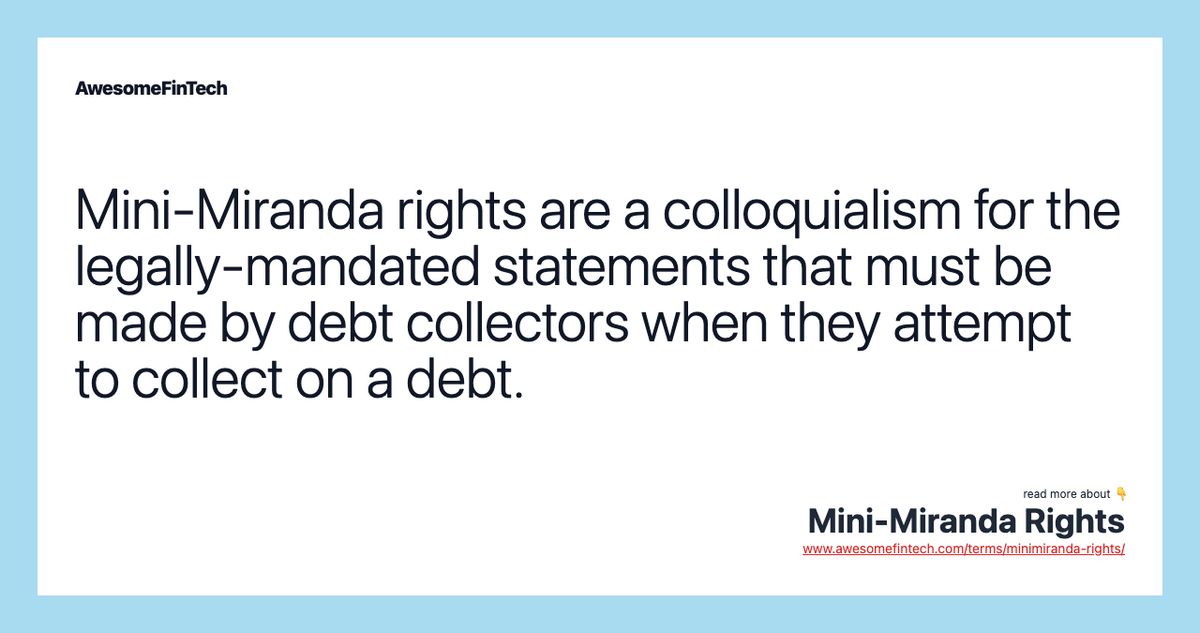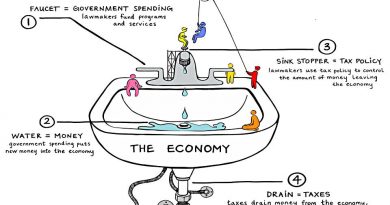Mini-Miranda Rights What They Are How They Work

Contents
- 1 Mini-Miranda Rights: What They Are, How They Work
- 1.1 What Are Mini-Miranda Rights?
- 1.2 Understanding Mini-Miranda Rights
- 1.3 Mini-Miranda Rights Requirements
- 1.4 What Personal Information Can Debt Collectors Request?
- 1.5 What Are My Options if a Debt Collector Uses a False Name?
- 1.6 What Do I Do if I Have an Attorney Handling My Debt?
- 1.7 The Bottom Line
Mini-Miranda Rights: What They Are, How They Work
What Are Mini-Miranda Rights?
Mini-Miranda rights are statements that a debt collector must use when contacting an individual to collect a debt. They must be recited if the debt collection effort is made over the phone or in person, and outlined in written form if a letter is sent to the debtor.
If the collection agency phones the debtor, the Mini-Miranda rights require the collector to inform the debtor that the call is from a debt collector, that they are calling to collect a debt, and that any information obtained during the phone call will be used to achieve this goal.
Key Takeaways
- Mini-Miranda rights are legally mandated statements made by debt collectors when attempting to collect a debt.
- Like traditional Miranda rights that inform arrestees of their rights, Mini-Miranda rights provide information about the debt being collected and who is seeking it.
- These rights and related information are set out by law in the Fair Debt Collection Practices Act (FDCPA) of 1977.
Understanding Mini-Miranda Rights
Mini-Miranda prevents a debt collector from using false pretenses to collect a debt. For instance, a heavily indebted person may use a fictitious name when answering the phone to avoid calls from collection agencies. The Mini-Miranda specifically prohibits the use of such tactics.
Mini-Miranda is not an official term, but rather a colloquialism. It gets its name from the Miranda rights or Miranda Warning, used by law-enforcement officers when arresting a suspect in a crime. The Miranda Warning states that the suspect has the right to remain silent, that anything said can be used against them in a court of law, and that the suspect has the right to an attorney.
Mini-Miranda Rights Requirements
In addition to what’s already been mentioned, the FDCPA specifies the time of day and frequency of contact between a debt collector and debtor. Debt collectors should not contact debtors at inconvenient times unless a prior arrangement has been made.
If the FDCPA is violated, a suit may be brought against the debt collection company, along with the individual debt collector, within one year of the violation.
Furthermore, while debt collectors may call a debtor’s place of business or home, the debtor can stop this by filing a written request to cease calling. In such cases, a collector is permitted to call relatives, neighbors, or associates of the debtor regarding the outstanding balance owed.
If you’re struggling to repay your creditors, you may want to consider working with a debt relief company to renegotiate or settle some of what you owe, in addition to hiring a credit counseling agency to help repair your credit.
What Personal Information Can Debt Collectors Request?
Before a debt collector may ask about debts, they must verify that they are speaking with the debtor. They may ask for your full name, date of birth, last four digits of your Social Security number, a past or current address, a recent transaction amount, your phone number, or your account number.
What Are My Options if a Debt Collector Uses a False Name?
If a debt collector uses a false name or other subversive tactic when they contact you, you may file a lawsuit against the company. You should also file a complaint with the Consumer Financial Protection Bureau.
What Do I Do if I Have an Attorney Handling My Debt?
If you have an attorney handling your debt, you should inform the debt collector. Once they have been informed, they should stop contacting you. If they persist, you may file a suit based on the FDCPA.
The Bottom Line
Debt collectors will go to extraordinary lengths to recover debts for their clients, but they are restricted by the FDCPA. If someone contacts you, they must identify themselves and their intent by using the Mini-Miranda. If you feel that you have been contacted without this step, you may file a complaint or suit to address the violation.
Debt collectors will go to extraordinary lengths to recover debts for their clients, but they are restricted by the FDCPA. If someone contacts you, they must identify themselves and their intent by using the Mini-Miranda. If you feel that you have been contacted without this step, you may file a complaint or suit to address the violation.



